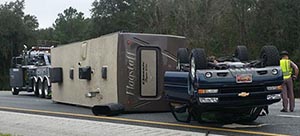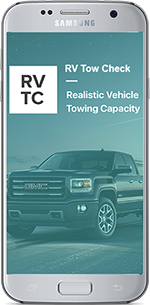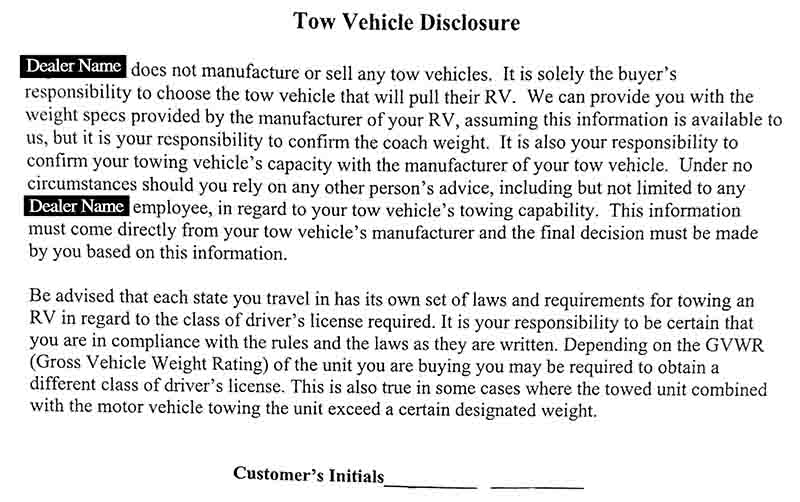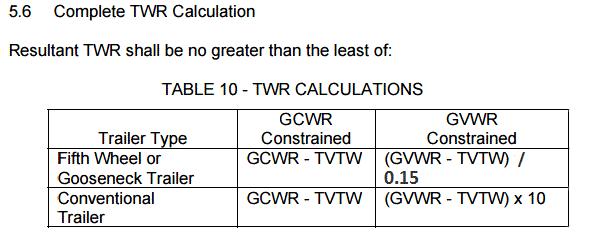“I’m sorry sir, that truck can’t tow this trailer.”
From my personal experience and the comments of others I've read on several forums, I wonder if you'll hear those words from a salesperson unless you point to a Toyota Tacoma like I did. Of course, I was joking.
Any salesperson's job is to sell, and no dealer in the U.S.A. is under any legal obligation to ensure a purchase is correctly matched. Some dealers will have you sign a document waving them from any responsibility. SEE ACTUAL DEALER'S DOCUMENT HERE.
As a buyer, I believe having as much information in-hand as possible before purchasing is essential. Sadly, all too often, a salesperson may say whatever is needed to get you to buy without regard to what tow vehicle you have. After informing the salesman I had a 2008 Dodge Ram 2500 diesel, he perked up and assured me my truck was big enough for the 41-foot toy hauler I had my eyes on. “We tow these trailers all the time with the 2500s,” the salesman said. To keep a long story short, I’ll tell you this: his untruthful sales pitch was revealed when I saw the bed of my 2500 nearly drop to the axle after raising the landing gear for the first time. (You can read more of my story here: My Truck Pulls it Just Fine!.)
Although I had researched towing RVs before my first purchase, I quickly learned how little I knew. I've learned a lot since then. Now, I hope to pass along some helpful information to you.
 Scott and Heather, from Florida, wanted to share their story so that others may benefit from their experience, but they also thought they had done enough research. They learned the hard way and survived a horrific accident that directly contributed to a grossly mismatched tow vehicle and trailer. Those familiar words heard from many salespeople told them, "It will tow it just fine." You can read their story here.
Scott and Heather, from Florida, wanted to share their story so that others may benefit from their experience, but they also thought they had done enough research. They learned the hard way and survived a horrific accident that directly contributed to a grossly mismatched tow vehicle and trailer. Those familiar words heard from many salespeople told them, "It will tow it just fine." You can read their story here.
Towing with mismatched vehicles or towing while exceeding the vehicles' weight safety ratings may not always be the primary factor in an accident. However, I am convinced that overweight conditions, mismatched combinations, or both exacerbate the severity of some accidents. After studying some of the reported accidents, I can't help wondering if they couldn't have been avoided, or the severity was minimized, if they weren't exceeding the weight safety ratings, or if the vehicles were matched correctly. One of the primary concerns of the National Highway Traffic Safety Administration (NHTSA) is ensuring that vehicle weight does not exceed the braking capacity.
One of the most common questions for RV buyers is something like this, “How much can I tow?” For some time, I avoided creating a calculator. During my research I continued to hear and read stories of how a buyer learned too late that they had purchased the wrong towing combination. It was either revealed when the truck bed lowered close to the axle, or when the vehicle's powertrain struggled towing uphill.
Not long ago, I completed a survey asking this question:
"Would you benefit from having a handy free calculator that provides peace of mind when purchasing a new tow vehicle or RV that’s readable on all smart devices and answers, 'Can I tow that?'”
A brief app history
An overwhelming 86% of the participants said yes. After reading these results, I developed the first-of-its-kind web-based app, Before You Buy RV. This original app was the most used provided by Fifth Wheel Street. The Before You Buy app required two individual steps to complete. The user's goal was to achieve a GO status in each step before the purchase to be considered a safe towing combination. Step 1 assisted the user in calculating the maximum tow capacity. Step 2 verified that the weight would not overload the rear axle. Step 2 was further complicated by selecting either a fifth wheel or conventional tow.
Out with the old - In with the new!
One of my lifelong mottoes has been: "There's always room for improvement." With that in mind, I took it as a personal challenge to simplify the two-step process required by the Before You Buy RV app and develop something new into a simple app. The research and determination to succeed paid off.
Without further ado, I present to you...

The minimum requirement for the RV Tow Check app is four inputs from the buyer or dealer. I must say, no legitimate calculator can correctly provide the accuracy you desire without these four inputs. They are gross combination weight rating (GCWR), gross vehicle weight rating (GVWR), gross vehicle weight (GVW), and trailer weight rating (TWR). If not installed in the truck, the user can select a fifth wheel hitch. They may include any additional unscaled weight for cargo and additional passenger weight. The app does not assume everyone weighs 150 pounds, like the manufacturers.
The RV Tow Check app may look simple on the outside. Still, the engine on the inside is strong, and the sophisticated math formulas perform multiple calculations and make decisions that should make any buyer or dealer grateful. With the four minimum user inputs and selecting the highest pin and tongue percentages, buyers and dealers can be confident that the RV purchase or sale will not exceed the vehicle's GCWR, GVWR, GAWR, and TWR. Two outputs are shown, one for the fifth wheel towing combination and the other for the conventional towing combination. RV Tow Check is the first app that simultaneously displays fifth wheel and conventional RV classifications, providing instant results when selecting various pin or tongue percentages.
The RV Tow Check app complies with the GCWR and GVWR SAE J2807 TWR Calculation methodology.
 Now, the greatest news! RV Tow Check is now available for FREE!
Now, the greatest news! RV Tow Check is now available for FREE!There's only one mobile friendly app that supports manufacturers' safety and warranty warnings and the SAE J2807, and helps keep buyers or owners from exceeding the GVWR and GCWR as long as they input the correct information.
Author: David W. Gray
Original Date Published: December 6, 2015, three revisions
Categories: Recreational Vehicle, RV Safety, Vehicle Towing Capacity
©2013-2025, David W. Gray, all rights reserved. No portion of this article shall be reprinted without the permission of the author.
A forum member named 8Muddypaws says that the RV Tow Check App should be called the "RV Sales BS Detector."
Do you want to get the quick run down on the 2015 half-ton, three-quarter and one ton trucks? Visit the following three pages.
Half-ton Truck Realistic Towing Capacity
Three-quarter Ton Truck
Realistic Towing Capacity
One Ton Truck Realistic Towing Capacity
Q: What about axle air springs (bags) like the Firestone Ride-Rite - Want they increase my load capacity?
A: No. Here is a direct quote from Firestone/Ride-Rite: "Please remember that air springs do not increase the load carrying capacity of your vehicle. *DO NOT EXCEED THE VEHICLE'S RECOMMENDED GROSS VEHICLE WEIGHT RATING (GVWR)"
That on any RV forum you'll read statements similar to the following?
"You cannot change the manufactures tow rating or carrying capacity."
or...
"You may be able to change the capabilities of the truck, if you address all weak links in the chain, but you cannot change the manufacturer's rating."
The big question is, is there any part of this assertion true? After an informative conversation with a representative at NHTSA, we have an answer. Read the following article to learn more.
| RV Business advertisers, click here. |
©2011-2025 Fifth Wheel St. and Fifth Wheel Street, All Rights Reserved. Use of this website constitutes acceptance of the Privacy Statement and Terms and Conditions of Use.


